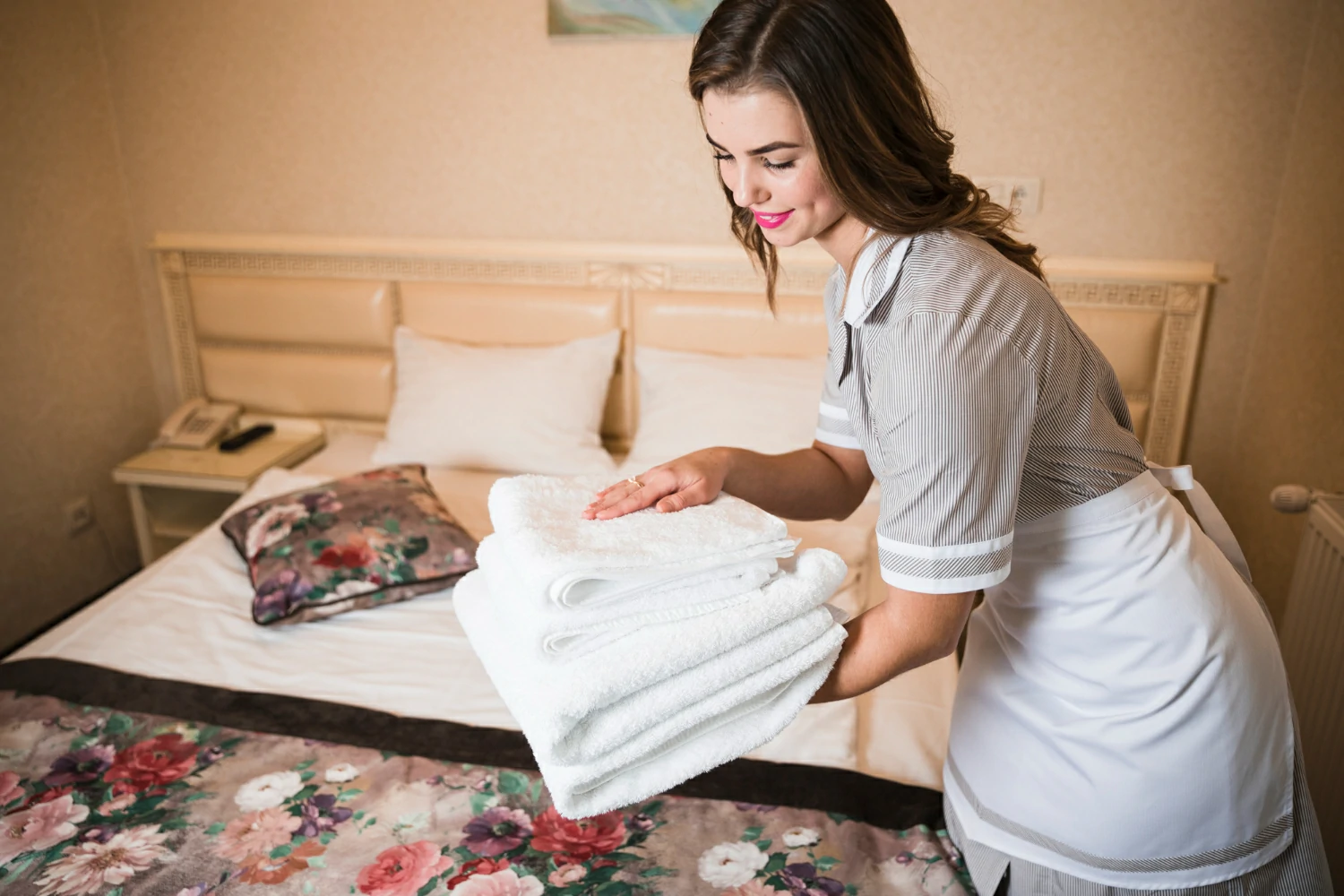How often do hotels wash comforters? Answer is – Hotel comforter cleaning practices vary significantly. While high-end hotels may wash comforters after each guest, many mid-range and budget hotels only wash them quarterly or less frequently. Visible stains or guest requests often prompt washing. It’s worth noting that duvet covers, if used, are more likely to be washed with the sheets.
Summary
- Hotel comforter washing frequency is inconsistent and depends on hotel standards.
- Luxury hotels often prioritize cleanliness and may wash comforters after each stay.
- Budget-friendly hotels might have less frequent comforter washing schedules.
- Duvet covers are more likely to be washed regularly, but not guaranteed.
- Guests can inquire about specific hotel cleaning policies for peace of mind.
How often do hotels wash comforters?
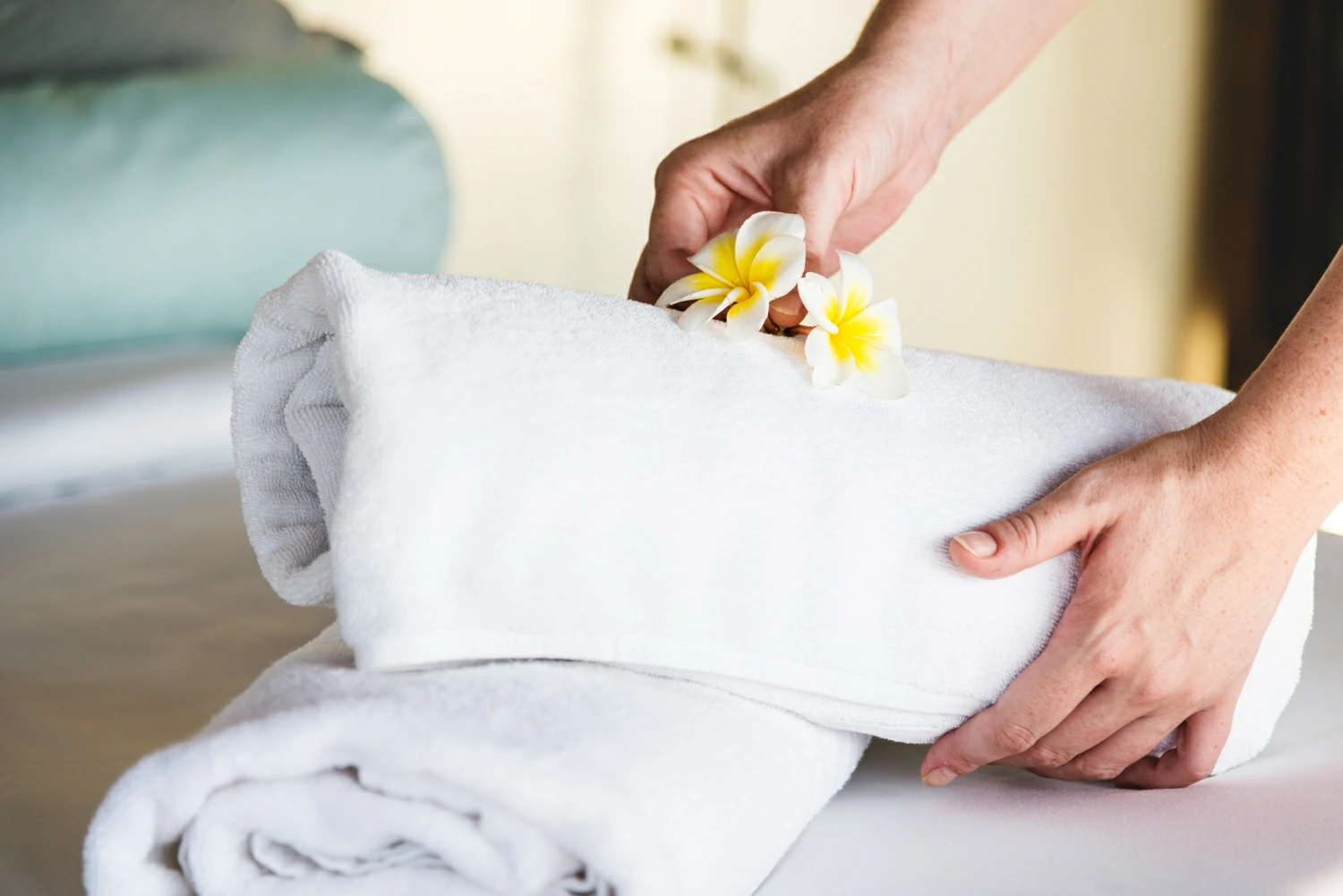
A comfortable and hygienic hotel stay is something most travelers seek. While crisp sheets and fluffy pillows immediately come to mind, the cleanliness of another key bedding component often sparks a sense of unease: the hotel comforter. This seemingly cozy layer raises questions about its cleanliness and raises concerns about the potential for hidden allergens, bacteria, and other unwanted residues.
The Importance of Cleanliness in Hotel Stays
Cleanliness ranks as one of the most important factors influencing guest satisfaction in the hospitality industry.
A 2022 survey by Tripadvisor found that over 80% of travelers consider cleanliness an extremely important factor when choosing a hotel.
A clean hotel room offers guests a sense of peace of mind, providing a haven where they can relax and feel at ease during their stay.
Conversely, a less-than-hygienic environment can create a negative guest experience. Unpleasant odors, visible stains, or the mere thought of accumulated dirt and germs can detract significantly from the desired feeling of comfort.
This underscores why hotels make significant investments in housekeeping staff, cleaning supplies, and laundering processes – their reputation often hinges on maintaining a pristine environment for guests.
Public Concerns about Hotel Comforter Hygiene
While hotels generally place a significant emphasis on cleanliness, one particular item tends to spark a sense of unease among guests: the comforter.
Unlike sheets and pillowcases, which appear freshly laundered, comforters often have a heavier and more substantial feel. This raises doubts in travelers’ minds:
- Infrequency of Washing: Due to the size and bulk of comforters, along with the time and resources needed to launder them, there’s the lingering question of how frequently hotels wash these items.
- Invisible Residues: Even if a comforter appears clean, there’s concern about the invisible – sweat, skin cells, microscopic allergens – that might linger from previous guests.
- Sensitivity Concerns: For those with allergies or sensitive skin, a less-than-hygienic comforter can lead to discomfort, irritation, or even allergic reactions.
These worries have been intensified by various online investigations and exposés on hotel cleaning practices. Some reports reveal that comforters may only be washed a few times a year in some establishments.
These revelations naturally amplifying public concern and put hotels under even greater scrutiny to maintain cleanliness standards.
Dr. Susan Parker Expert Opinion
“From a guest’s perspective, a plush comforter is an appealing part of the hotel experience. However, it’s crucial for hotels to strike a balance between comfort and hygiene,” says Dr. Susan Parker, a public health specialist with expertise in hospitality sanitation. “Regularly scheduled and thorough cleaning of comforters, as well as utilizing clean duvet covers, is essential to mitigate any potential health risks and maintain guest trust.”
The focus on hotel comforter hygiene is here to stay. Smart hoteliers will recognize these evolving guest concerns and prioritize practices that ensure not only the appearance of cleanliness but a truly sanitized sleep environment.
This attention to detail will pay off by enhancing guest satisfaction, loyalty, and ultimately drive more positive reviews and recommendations.
How Often Do Hotels Wash Comforters?
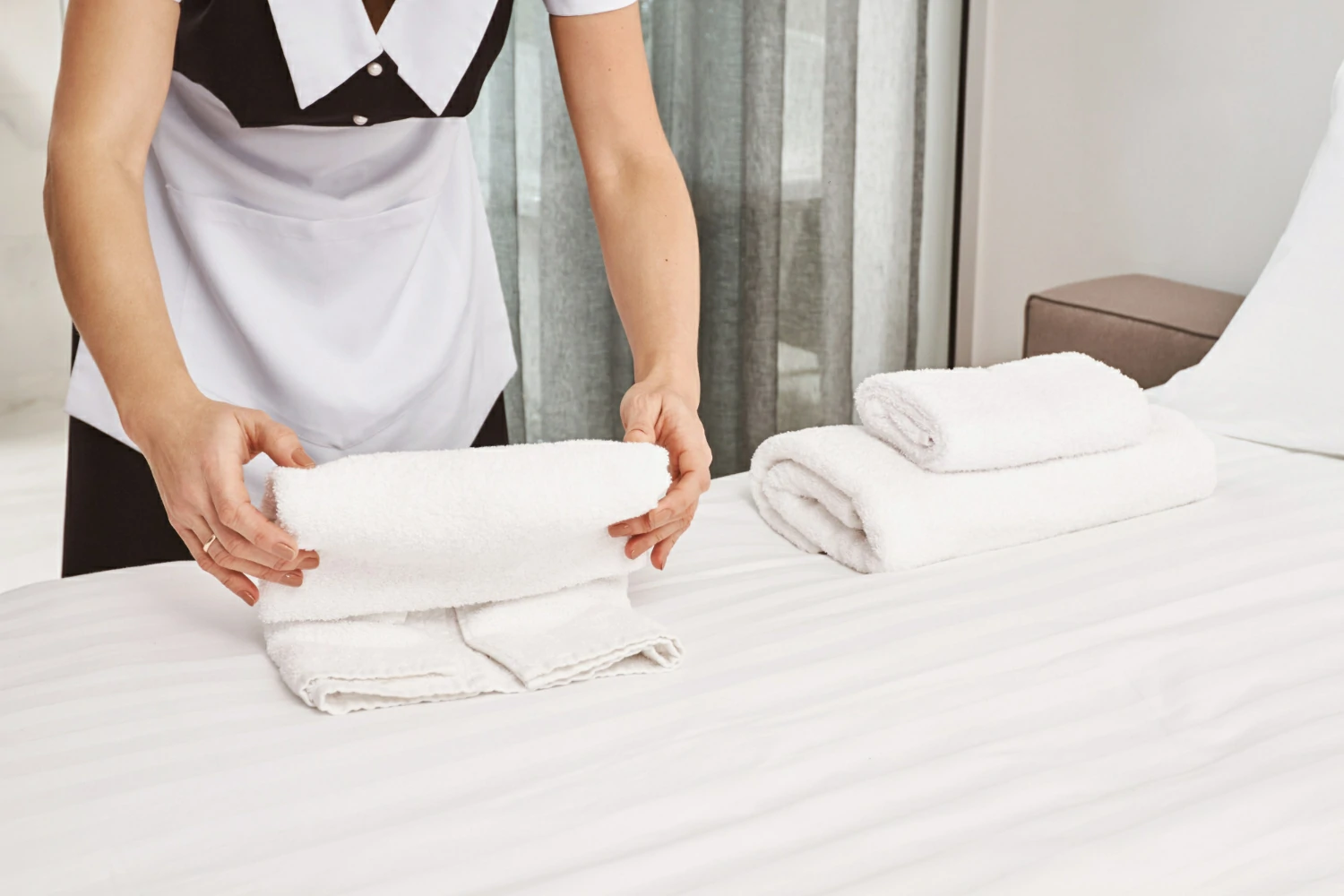
Unfortunately, there’s no single definitive answer to the question of how often hotels wash their comforters.
Cleaning frequencies differ widely across the hospitality industry, influenced by a range of factors, including the hotel’s classification and internal hygiene standards. Here’s a breakdown of typical practices:
1. Luxury Hotels
Luxury hotels, where exceptional guest experience is paramount, often prioritize the highest standards of cleanliness. In these establishments, it’s more likely that comforters are washed after each guest’s departure.
This practice ensures a sense of freshness and underscores the hotel’s commitment to providing a pristine sleeping environment.
“We understand that our guests place a premium on a clean and luxurious stay,” explains Maria Torres, Head of Housekeeping at the renowned five-star Grandview Hotel. “Thorough cleaning and laundering of every comforter after each guest checks out is an integral part of delivering on that expectation.”
2. Mid-Range Hotels
Mid-range hotels offer a blend of comfort and affordability. Comforter cleaning practices in these establishments might be less consistent.
Some may wash comforters as frequently as weekly, while others adopt a monthly or even quarterly schedule.
This variation often hinges on factors such as hotel occupancy rates, staffing resources, and their specific cleaning protocols.
3. Budget Hotels
Hotels in the budget category generally aim to provide basic comforts at the most economical price point.
This emphasis on affordability may sometimes come at a slight cost to cleaning frequency.
In some budget hotels, comforters might only be washed a few times a year, unless there’s a visible need for cleaning due to stains or spills.
4. The Role of Duvet Covers
Many hotels, regardless of their category, use duvet covers to protect their comforters. A duvet cover is a removable encasing that acts as a barrier between the guest and the actual comforter.
These covers offer several benefits from a hygiene perspective:
- Easier to Launder: Duvet covers are usually made of lighter materials, making them easier to remove, wash, and dry, compared to the bulkier comforter itself.
- Frequent Washing: Duvet covers are typically changed and laundered along with the bedsheets after each guest stay, creating an additional layer of cleanliness.
- Protection for Comforter: The duvet cover shields the comforter from direct contact with the guest, extending its lifespan and reducing the need for frequent washing.
William Banks Expert Opinion
“Hotels that utilize duvet covers tend to have a hygienic edge,” remarks Professor William Banks, a hospitality management specialist. “The ease of cleaning these covers allows hotels to maintain higher freshness standards, often ensuring that the portion of the bedding directly touching the guest gets laundered with each room turnover.”
Factors Affecting Comforter Washing Frequency
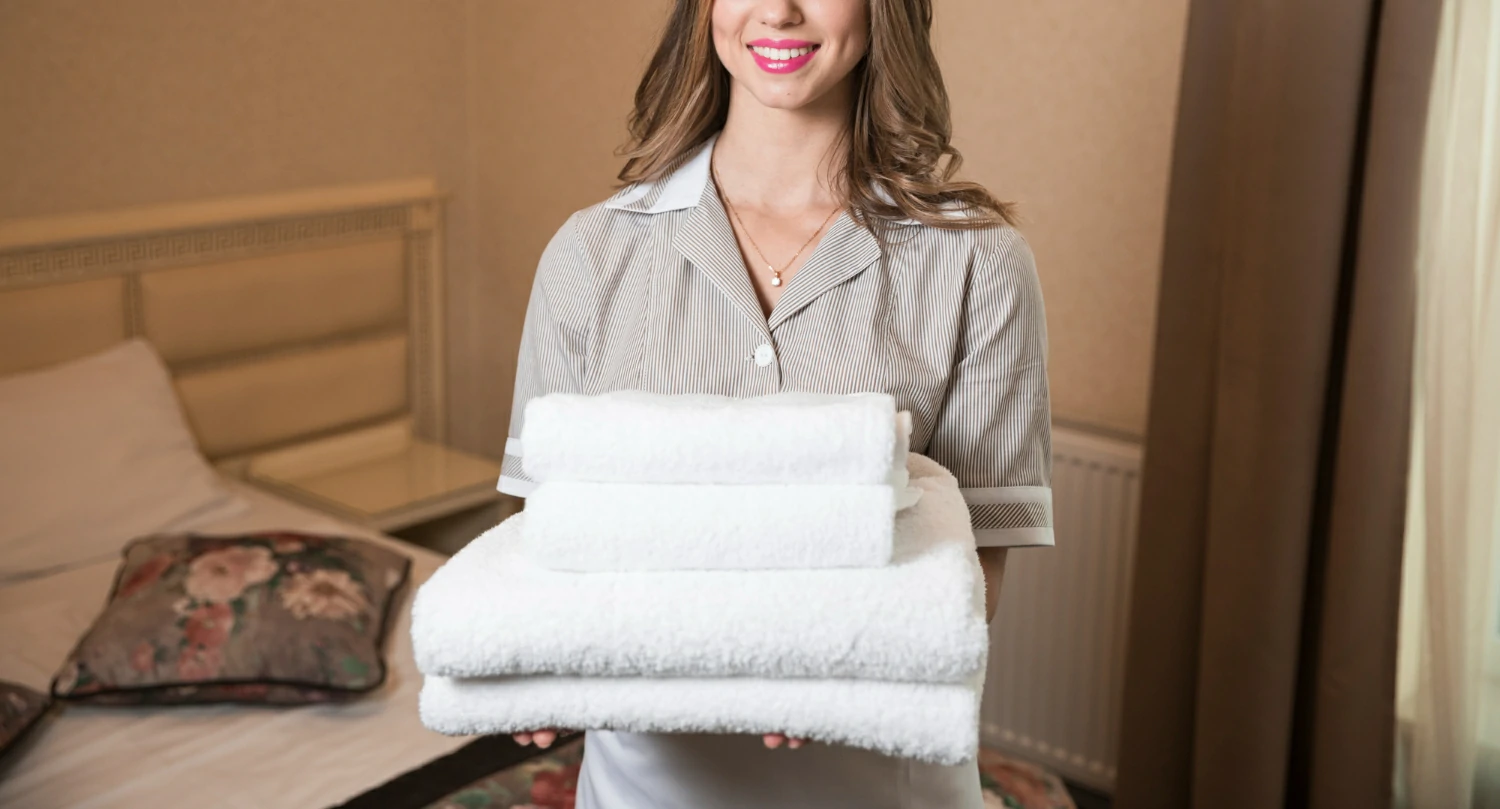
As we’ve seen, there’s no universal cleaning schedule for hotel comforters. Here’s a closer look at the key factors that dictate how often they’re washed:
1. Hotel Standards
A hotel’s overall classification and its internal hygiene standards play a significant role in determining comforter-washing frequency. Here’s why:
Luxury Focus: Premium hotels are built around providing a top-notch guest experience, and that includes exceeding expectations for cleanliness. They are more likely to invest resources into frequent comforter cleaning.
Budget Constraints: Budget hotels, operating on tighter margins, may have less flexibility in their cleaning budgets, potentially leading to less frequent comforter washing cycles.
2. Occupancy Rates
The volume of guests a hotel accommodates directly impacts how often bedding is laundered.
High Occupancy: Hotels experiencing high occupancy rates and quick room turnovers naturally need to have their linens and bedding cleaned more often to cater to new guests. This can include washing comforters more frequently.
Low Occupancy: Establishments with longer guest stays or fewer rooms occupied might have longer durations between comforter washings.
3. Visible Stains or Spills
Regardless of a hotel’s standard washing schedule, one thing is certain: any visible stains, spills, or signs of soiling on a comforter will prompt immediate cleaning.
Housekeeping staff are trained to spot these issues, and soiled comforters would be removed and laundered right away to ensure the room is presentable for the next guest.
4. Guest Request
Guest satisfaction is a top priority for hotels, and specific requests related to cleanliness are often taken seriously.
Peace of Mind: If a guest expresses concern about the cleanliness of a comforter, most hotels would readily provide a fresh one or have the existing comforter cleaned upon request.
Allergies or Sensitivities: Guests with known allergies or sensitivities may request freshly laundered comforters, and hotels generally try their best to accommodate these needs.
Sarah Bennett Expert Opinion
“Hotels, especially those in competitive markets, understand the impact of guest perception when it comes to cleanliness,” says Sarah Bennett, a hospitality consultant with over a decade of industry experience. “While there might be internal washing schedules, flexibility and willingness to address specific guest concerns goes a long way in building trust and loyalty.”
What Does This Mean for Hotel Guests?

The variation in hotel comforter washing practices calls for both awareness and proactiveness on the part of travelers.
Understanding these hygiene realities can aid in setting realistic expectations and empowering guests to prioritize their own comfort levels. Here’s how:
1. Peace of Mind
Knowledge is power, and don’t hesitate to ask! When making a hotel reservation or upon check-in, inquire about the hotel’s specific practices when it comes to comforter cleaning. Here are some questions to ask:
- How frequently are the comforters washed in the rooms?
- Are duvet covers used, and how often are they laundered?
- Is it possible to request a freshly laundered comforter upon arrival?
Hotels that are committed to cleanliness will be transparent in answering these questions. Their responses can help you gauge the level of hygiene prioritization and alleviate any concerns you might have.
2. Proactive Measures
For those seeking an extra layer of assurance, bringing a personal travel blanket can be a simple, yet effective solution. Here’s why this is a smart move:
- Personal Comfort: A lightweight, familiar blanket offers a sense of comfort and cleanliness, reducing reliance on the hotel’s comforter.
- Allergy-Friendly: If you have allergies or sensitivities, using your own blanket from home minimizes potential irritation from unfamiliar detergents or residues.
- Packing Tip: Many travel blankets are designed to be compact and easily packable, minimizing the extra luggage burden.
3. Understanding the Risks
It’s important to acknowledge that, particularly in budget-oriented hotels, comforters may not be washed with the same frequency as linens.
Being aware of this possibility empowers you to make informed choices and take action if necessary.
Dr. Michael Thompson Expert Opinion
“Travelers should feel empowered to prioritize their personal hygiene standards while staying at hotels,” emphasizes Dr. Michael Thompson, a public health specialist. “Knowing that comforter cleaning varies, don’t hesitate to speak up. Inquiring about hotel policies, and being prepared with alternatives like a travel blanket, grants you control over your level of comfort.”
Tips:
- Upon entering your hotel room, visually inspect the comforter for any obvious signs of stains or wear.
- If the hotel utilizes duvet covers, check the cover for cleanliness and request a fresh one if needed.
- Remember, most hotels are happy to accommodate reasonable requests related to cleanliness for their guests’ peace of mind.
Alternatives to Traditional Comforters
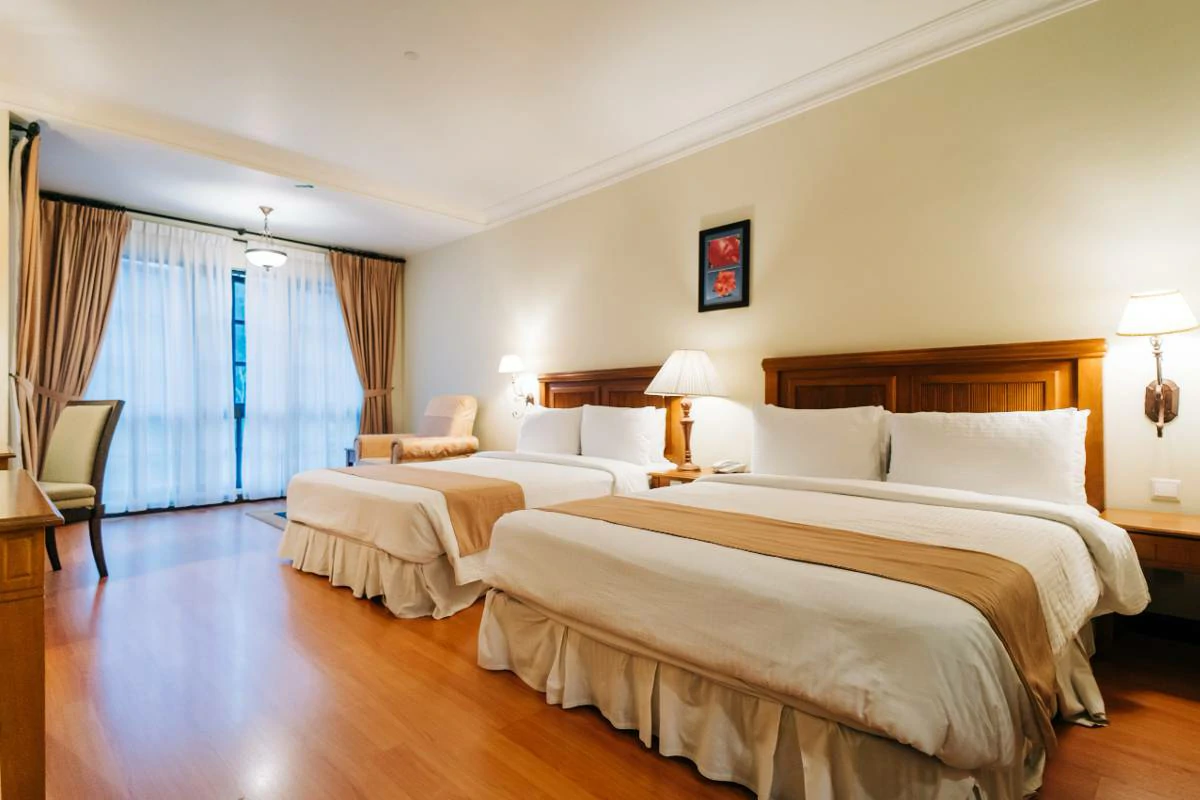
As concerns about comforter hygiene continue to surface, forward-thinking hotels are exploring alternatives that offer increased freshness and address guest preferences. Here are two popular options gaining traction:
1. Triple Sheeting
The triple sheeting method eliminates the bulky comforter and instead focuses on layering multiple sheets to achieve the desired warmth and comfort. This practice is becoming widespread, especially in higher-end hotels. Here’s how it works:
The Base Layer: A fitted sheet covers the mattress as usual.
The Middle Layer: A flat sheet is tucked neatly over the fitted sheet.
The Top Layer: A second flat sheet replaces the traditional comforter, often tucked in at the sides and foot of the bed for a tailored look.
Customization: Guests can adjust the layers to their liking, adding or removing a sheet for personal temperature preferences.
Benefits of Triple Sheeting:
Enhanced Hygiene: With each guest change, all the sheets in contact with the sleeper are replaced, providing a sense of maximum freshness.
Easier Laundering: Sheets are lighter and easier to launder than bulky comforters, leading to more frequent washing cycles.
Allergy-Friendly: Freshly laundered sheets with each turnover can be beneficial for those with allergies or sensitivities.
Luxurious Feel: Using high-quality, crisp sheets can create a feeling of indulgence comparable to a plush comforter.
2. Lightweight Blankets
Some hotels are moving away from heavy comforters and opting for lightweight, machine-washable blankets. This offers a practical and hygienic solution.
Variety of Materials: Blankets made from materials like cotton, fleece, or microfiber provide ample warmth while still being easy to clean.
Frequent Washing: These blankets can be laundered as needed or even with every room turnover, enhancing the feeling of cleanliness for guests.
Reduced Storage Needs: Lightweight blankets take up less space in linen storage compared to bulky comforters, simplifying housekeeping processes.
- Jessica Wells Expert Opinion
- “Hotels are increasingly recognizing the need to adapt their bedding practices to align with evolving guest expectations for cleanliness,” notes Jessica Wells, a hospitality design consultant. “Alternatives like triple sheeting and lightweight blankets offer both practical hygiene benefits and the potential to create a uniquely luxurious sleep experience.”
Tips for a Hygienic Hotel Stay

While you can’t completely control every aspect of hotel cleanliness, there are simple and effective steps you can take to minimize risks and enhance your peace of mind:
1. Inspect the Comforter
Upon entering your room, take a few moments to visually inspect the comforter. Here’s what to look for:
- Stains: Any noticeable stains or discoloration on the comforter should raise a red flag.
- Odors: If the comforter has a lingering musty or unpleasant smell, it may not have been adequately cleaned.
- Signs of Wear: Look for any tears, rips, or excessive pilling that indicate the comforter is older and may be nearing replacement.
2. Request a Freshly Laundered Comforter
Most hotels are more than willing to accommodate reasonable requests for fresh bedding.
Upon arrival or while making your reservation, don’t be afraid to ask for a freshly laundered comforter (and even the sheets, too!). Emphasize that this preference contributes to your peace of mind.
3. Use the Top Sheet as a Barrier
Even if you’re confident in the hotel’s cleaning practices, using the top sheet of the bed as a barrier between yourself and the comforter adds an extra layer of protection.
This simple step minimizes potential contact with any residues that might linger on the comforter.
4. Consider a Travel Blanket
Packing a lightweight travel blanket serves multiple purposes:
Comfort Control: It allows you to customize your sleep experience according to your preferred warmth level.
Hygiene Assurance: If you’re still uneasy about the comforter, your travel blanket provides a familiar and clean layer.
Versatile Travel Accessory: Travel blankets come in handy for flights, trains, or even chilly indoor spaces during your trip.
Dr. Emily Parker Expert Opinion
“Taking proactive steps during your hotel stay gives you a sense of control over your own hygiene and comfort,” advises Dr. Emily Parker, an infectious disease specialist. “Simple choices like inspecting your bedding, using the top sheet, or bringing your own blanket can make a significant difference in your overall peace of mind.”
Conclusion
While the fluffy comforter beckoning you in a hotel room may promise a cozy night’s sleep, the reality of its cleaning frequency can be somewhat unpredictable. Hotel comforter washing practices vary considerably, ranging from being washed after every guest to less frequent schedules that might stretch to quarterly or less often. Factors such as hotel class, occupancy rates, and individual policies all play a role in how frequently these comforters are cleaned.
Understanding this variation empowers travelers to be proactive about their hygiene and well-being during their stay. Inquiring about cleaning policies, inspecting bedding, requesting fresh comforters, and utilizing the top sheet as a barrier are all simple steps that can enhance your sense of comfort and cleanliness.
Many hotels are actively embracing bedding innovations, such as triple sheeting or lightweight blankets, as a response to guest concerns. This shift towards prioritizing hygiene and ease of cleaning is encouraging for travelers seeking a worry-free stay. Being informed, aware, and prepared with options like a personal travel blanket grants you the power to prioritize your hygiene standards and have a comfortable and worry-free hotel experience.
FAQs
Are hotel comforters clean?
The cleanliness of hotel comforters varies depending on the specific hotel’s practices and the frequency of washing. While some hotels, especially luxury ones, wash their comforters after each guest, others may have longer intervals between washing.
Should I sleep directly under a hotel comforter?
While it is a personal preference, it’s wise to use the provided top sheet as a barrier between yourself and the comforter for an added layer of hygiene. If you have concerns, request a freshly laundered comforter.
Can I get sick from a hotel comforter?
While unlikely, it’s possible for an infrequently washed comforter to harbor allergens, bacteria, or residual bodily fluids from previous guests. This is especially a concern for those with allergies or sensitivities. Taking precautions minimizes the potential for discomfort or reactions.
What are alternatives to hotel comforters?
Many hotels are adopting alternatives such as triple sheeting with multiple flat sheets or easily washable lightweight blankets. These offer enhanced hygiene and ease of cleaning.
Should I bring my own blanket to a hotel?
Packing a lightweight travel blanket gives you peace of mind and an extra layer of comfort. It’s particularly beneficial if you have any concerns about hotel comforter hygiene.
